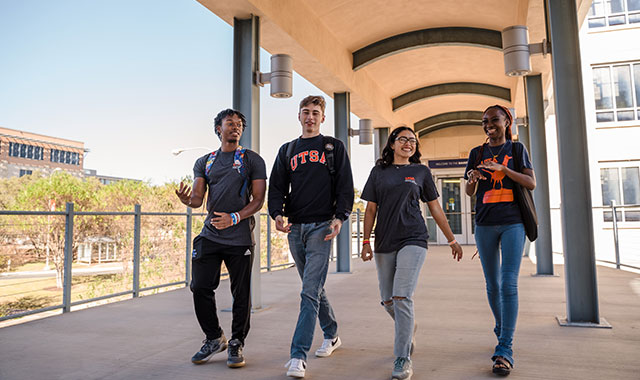The mission of Restorative Practices is to foster a caring, just, and peaceful campus culture where all UTSA community members belong and flourish.
Restorative Practices at UTSA
Restorative Practices are grounded in Restorative Justice theory, rooted in aboriginal and indigenous cultures. Restorative Justice is a way to prevent or respond to harm in a community with an emphasis on healing, social support, and active accountability. Restorative Justice includes a variety of practices with many rooted in indigenous and religious traditions. Some practices help prevent harm by helping people build relationships and strengthen community. Other practices respond to harm by helping to clearly identify harms, needs, and solutions through an inclusive and collaborative decision-making process.
– David Karp
Restorative Practice aims to foster a caring, just, and peaceful campus community for all through:
- Centering relationships grounded in mutuality in everything we do;
- Educating about restorative justice history, philosophy, values, benefits, and practices,
- Creating opportunities for authentic and mutually respectful community building and dialogue,
- Enabling collective problem-solving,
- Facilitating opportunities to repair harm to the extent possible meaningfully, and
- Building partnerships that advance restorative justice values, philosophy, and practices throughout UTSA and beyond.

Contact
Director of Restorative Practices, Associate Professor of Practice
The College for Health, Community and Policy
robert.rico@utsa.edu“Restorative justice is crucial to a college campus and communities as a whole. The work Dr. Rico has been pioneering at UTSA gives a new human centered perspective on how to work with conflict, crime, tragedy, and community engagement on campus. ”
What are Restorative Practices?
Restorative practices are a relational non-punitive approach to addressing student misconduct/ faculty/staff conflicts that help support healthy relationships and enhance the community. The models used are Victim-Offender Mediation (VOM), Conferencing, and Circles.
Victim-Offender Mediation (VOM) promotes mutually respectful dialogue between the harmed and responsible parties and attempts to resolve the conflict. Both parties discuss how the incident affected each other and the necessary steps to repair the harm.
Conferencing is a process that allows the parties in conflict to invite support groups such as parents, relatives, or anyone they feel is essential to be part of the dialogue. The process provides an opportunity for problem-solving by all stakeholders.
Circles originated from aboriginal and indigenous cultures known as "peacemaking circles". The community-based practice allows influential community members to participate in authentic dialogue and resolve conflicts.
Restorative Practice Programs
Community Building and Reconnect Circles –a community-based process to reconnect with each other, strengthen relationships, and create a sense of shared purpose.
La Platica – is a restorative community space for students to come together and get to know each other better, which enhances a sense of belonging and helps their academic success.
Restorative Campus Consultant – provide presentations across campus to introduce restorative justice practices to enhance the quality of interactions and dialogue of UTSA community members.
Restorative Community Gatherings - It is a space for authentic dialogue for reflecting on community trauma and offering compassion in supporting each other to cope with traumatic events.
Community Service, Partnerships, and Other Initiatives
Restorative Justice Undergraduate Course - the course provides students with a detailed study of the principles and practices of restorative justice.
Restorative Justice Practicum Graduate Course – the practicum allows students to explore and research the application of Restorative Practices. The course introduces possible uses of restorative practices in their field of work.
UTSA and Broader Community Partnerships - San Antonio Police Department Community Engagement Unit, University of San Diego Center for Restorative Justice Training, Against All Odds Rise, UTSA Westside Community Center, UP Partnerships - San Antonio, My Brother's Keeper San Antonio, San Antonio Rising Stars, Criminal Justice Department, UTSA Police Department, Multicultural Student Center for Equity & Justice.



